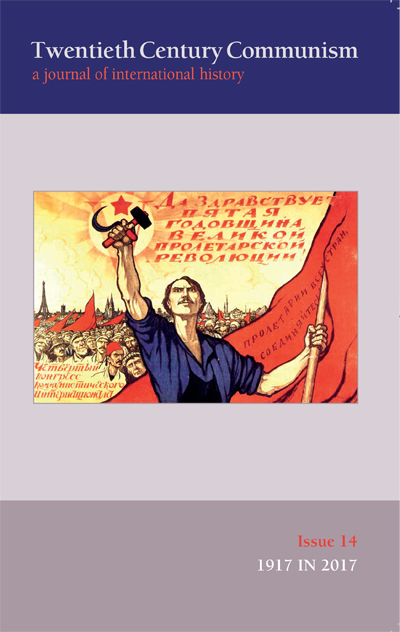
France and the centenary of October
Twentieth Century Communism - Print ISSN 1758-6437 - Online ISSN 2978-1329
Volume 2018 Number 14
France and the centenary of October
Gavin Bowd
Abstract
In 2017, French political discourse was permeated by the word ‘revolution’, while crowding out October. In the presidential elections, mainstream right-wing candidate François Fillon promised a ‘conservative revolution’, while, for the Front national, Marine Le Pen’s revolution made many think of Pétain’s Révolution Nationale. On the national-populist left, Jean-Luc Mélenchon stood for a ‘citizen’s revolution’ whose field of reference was explicitly the French Revolution. The successful candidate, Emmanuel Macron, promised a ‘progressive revolution’, drawing on both left and right. This universal use of the term ‘revolution’ could be interpreted as a doomed attempt by the political class to reconnect with and enthuse a cynical and weary electorate. October was paradoxically eclipsed by this revolutionary discourse. In the world of French publishing, the anniversary certainly did not dominate the mainstream, unlike the national then international phenomenon that had been Stéphane Courtois’s Black Book of Communism in 1997. Granted, popular historian and novelist Max Gallo chose October as the subject of what turned out to be his last work, but in 2017 October appeared mainly on and about the margins. Thus the year saw the French translation of Evgenia Yaroslavskaya-Markon’s Insurgent, the extraordinary account of a young revolutionary woman’s disillusionment with Bolshevik power and embrace of lumpenproletarian delinquency, all written with suicidally defiant candour in a special camp for political prisoners in the Arctic Circle, precipitating her execution in 1931. The right-wing catholic journalist Victor Loupan offered up a Secret History of the Russian Revolution, which gave a sensationalist, conspiratorial view of events, in which the ‘mystery’, the ‘hidden face’ of the ‘iceberg’ of 1917 was explained principally by the role of a handful of fanatical, often Jewish, individuals and the competing interests of American, British and German financiers and spies. More soberly, Nicolas Werth, who had contributed the Soviet chapter of Courtois’s Black Book, was given the prestigious job of writing for the Que sais-je? series a book that was devoted to what Werth chose to call ‘the Russian Revolutions’, thereby challenging a monolithic interpretation of 1917 as well as of the Bolsheviks themselves. On the other hand, Werth gave a neat, familiarly Gallocentric coda to his text: if, as Francois Furet had argued in The Past of an Illusion, the ‘charm of October’ lay in its revival of the ‘revolutionary idea’, the collapse of communism meant that ‘man’s eternal aspirations to more justice and freedom have rejoined the paths traced by the Enlightenment’.
SORRY - you are not registered as being permitted online access to the full text of this article
You have the following options:
- If you are viewing this via an institution or academic library you can ask that your institution takes out a Subscription to this journal.
- If you already have a Personal Subscription please login below
Forgotten your username / password? Click here to locate
- Purchase an annual Personal Subscription
PRINT + DIGITAL personal subscription (£30 / year)
DIGITAL personal subscription (£25 / year)
A Personal Subscription provides immediate access not only to the single article you are seeking, but also to all past and future articles in this journal up to the expiry of your annual (calendar year) subscription. - Purchase immediate access to this single article (UK£7.00) - Buy article Coming Soon
To cite this article
Gavin Bowd (2018) France and the centenary of October, Twentieth Century Communism, 2018(14)
